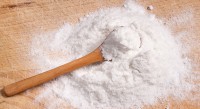What is salt?
Have you ever considered certain salt e.g Sea Salt or Rock Salt, may be better for you than others? At 121 dietitian we have been asked this very question. So you can see why we came to our conclusion we have provided some background info first.
What is salt made from?
 Salt is made up of two minerals (sodium & chlorine). Sodium naturally occurs in many plant and animal foods but for most of us it is the salt in our diets which is our main source of sodium. 1g of sodium is the equivalent to 2.55g of salt. If you see sodium on a food table the easiest way to decide how much salt the food contains is to multiply the sodium by 2.5.
Salt is made up of two minerals (sodium & chlorine). Sodium naturally occurs in many plant and animal foods but for most of us it is the salt in our diets which is our main source of sodium. 1g of sodium is the equivalent to 2.55g of salt. If you see sodium on a food table the easiest way to decide how much salt the food contains is to multiply the sodium by 2.5.
Sodium x 2.5 = Salt in grams
Why do we use salt?
Salt is used in cooking to add flavour to foods, boost the flavour of other ingredients and to act as a preservative. Most of the salt we eat comes from pre-prepared foods (75%) rather than the salt we add at the table.
Sea salt, rock salt or table salt is there a difference & which is better?
Sea salt, rock salt and table salt all contain around 100% sodium chloride which means that too much of any of them will have a negative effect on your health. However rock salt & sea salt are often marketed as being a healthier or tastier option than table salt. Both are considerably more expensive than table salt.
Sea salt is produced by the evaporation of sea water. It is argued that sea salt contains more minerals than table salt so is better for your health. However, just because it may contain extra minerals does not mean it is good for you. It would better to get these minerals from a balanced diet containing lots of fruit and vegetables than to consider sea salt as a healthy food.
Rock salt is also known as halite. It is different to sea salt because it is already found in a solid form and then mined.
Table salt (refined salt) can also be produced from solid salt which is found underground and then refined to remove any impurities. When the salt is being refined minerals such as calcium and potassium are often considered as impurities and so are removed in the refining process.
Since 75% of the salt we eat is already in the foods we buy and no salt is a “healthy” option, we here @ 121 Dietitian suggest the cheapest and best decision you can make is to not add any extra salt at all. Instead try experimenting with other flavours such as herbs, spices, garlic, chillies, lemon & ginger.
Which foods contain high levels of salt?
We mentioned that 75% of the salt we consume is already in the foods we buy. Foods which often have a high salt level include bacon, cheeses, ready-made stocks, soy sauce, tomato ketchup, mustard, ham and ready-made sauces. Try to limit how often you use these products and where possible choose the reduced salt options. You can also use nutrition labels to compare salt content when no reduced salt options are available.
What are the health effects of salt?
In the body sodium is actually essential, it is required to maintain fluid balance and for nerve signalling. Despite this, as a nation we needn’t worry about deficiency. It is recommended that adults have no more than 6g salt per day. But the average intake shown in the last national diet & nutrition survey was 8.6g per day (with many people consuming more than this). Really all we need to maintain our health is only around 1g of salt (a pinch).
Getting too much salt can be bad for our health. High intakes of salt are linked to increased blood pressure, which in turn can increase the risk of stroke and heart disease. Salt has also been linked to other conditions including osteoporosis, stomach cancer, kidney disease, kidney stones and obesity. It may also exacerbate the symptoms of asthma, Alzheimer’s and Diabetes.
How much salt is too much?
Recommended maximum salt intakes
| Age | Maximum Salt Intake |
| 0-6 months | Less than 1g / day |
| 6-12 months | 1g / day |
| 1-3 years | 2g / day |
| 4-6 years | 3g / day |
| 7-10 years | 5g / day |
| 11 years and above | 6g / day |
If you found this article interesting you can find more information on the Action Salt website www.actionsalt.org.uk or
chat to us @ 121 Dietitian: info@121dietitian.com
Make sure you have the correct nutritious foods to get you off to a great start. Check out the 121Dietitian Shop
Please visit my YouTube Channel.
If you have enjoyed this blog we would love you to share this with your family and friends on your social media channels.
Links included in this description might be Amazon affiliate links. If you purchase a product or service with the links that I provide I may receive a small commission.